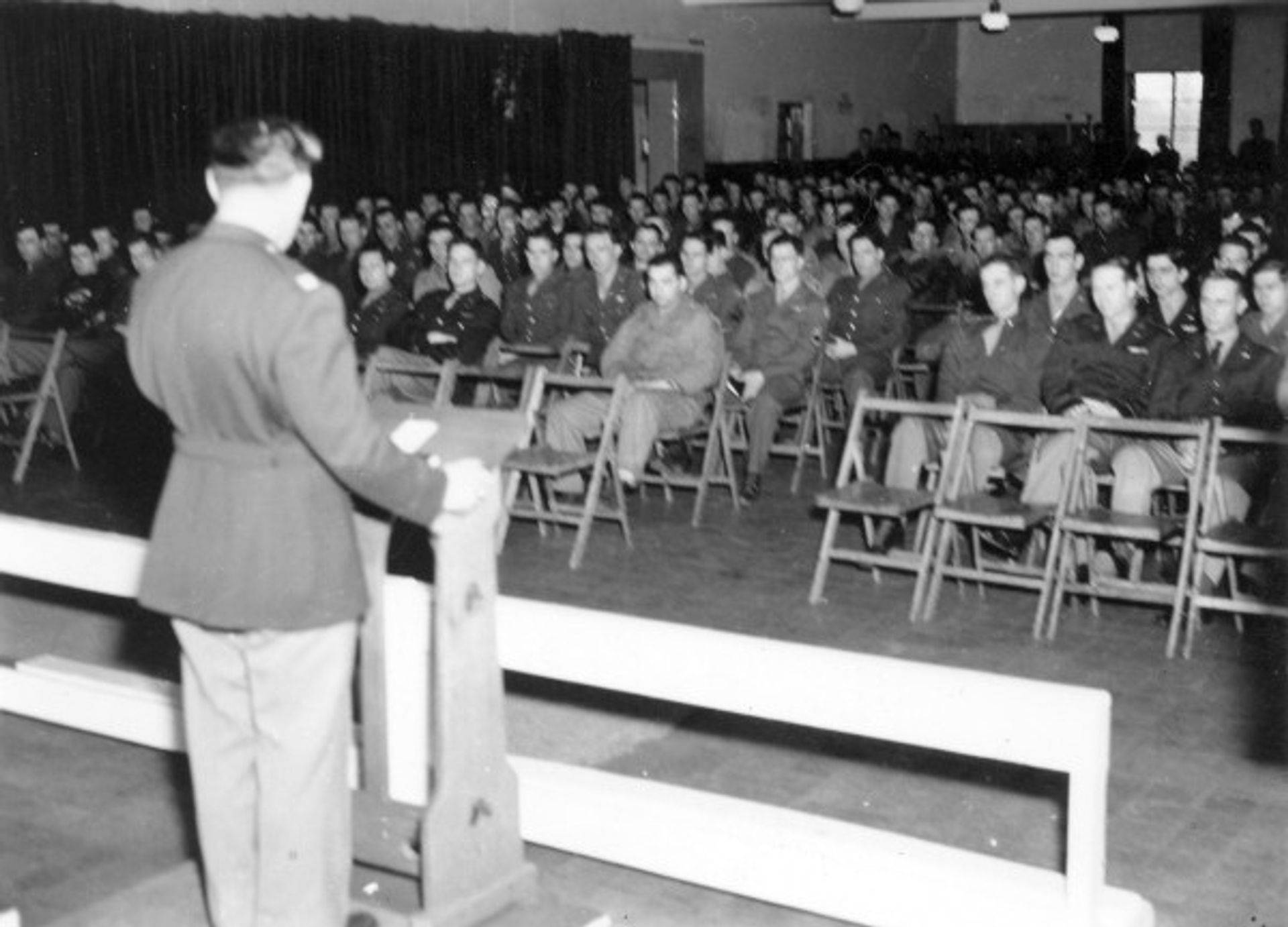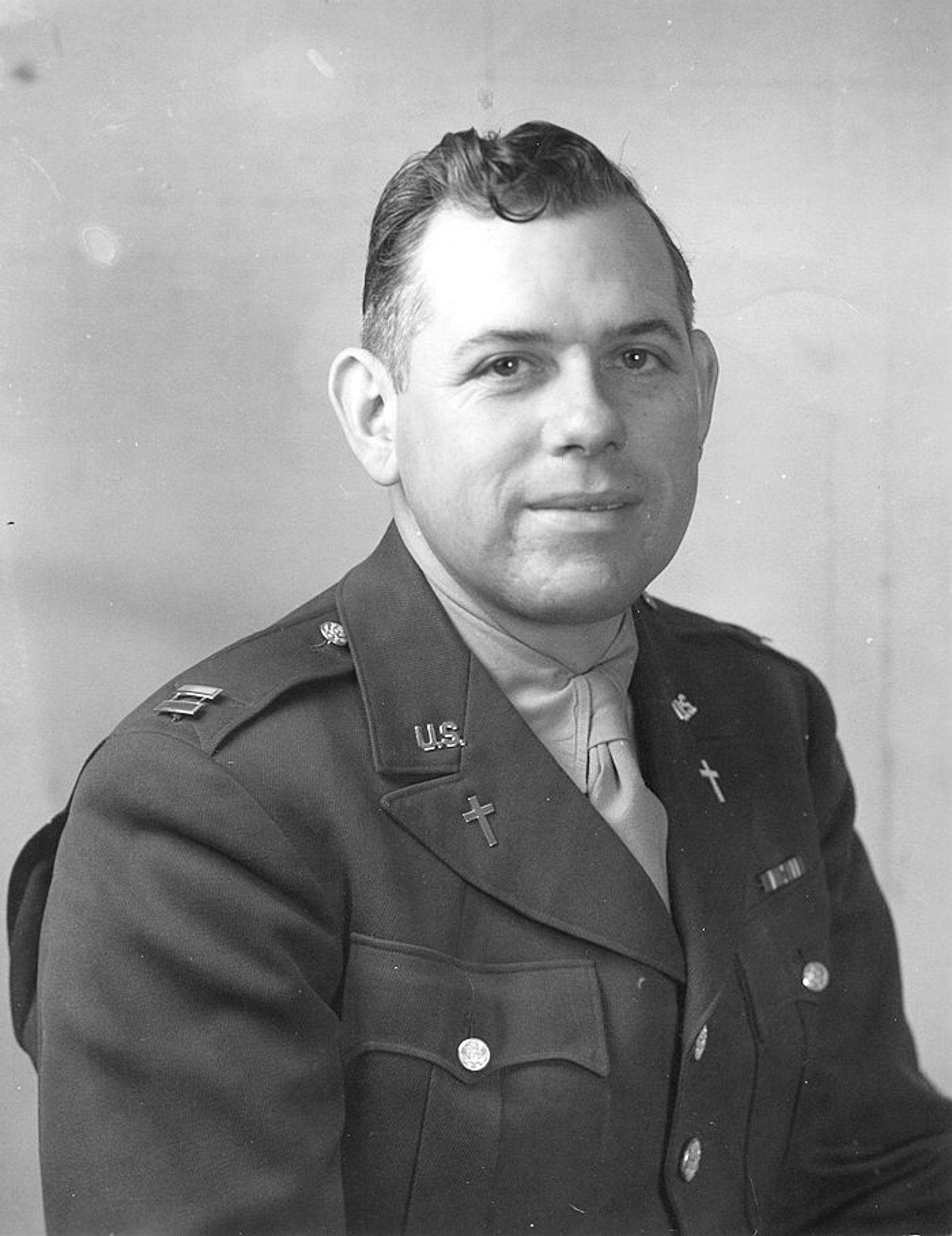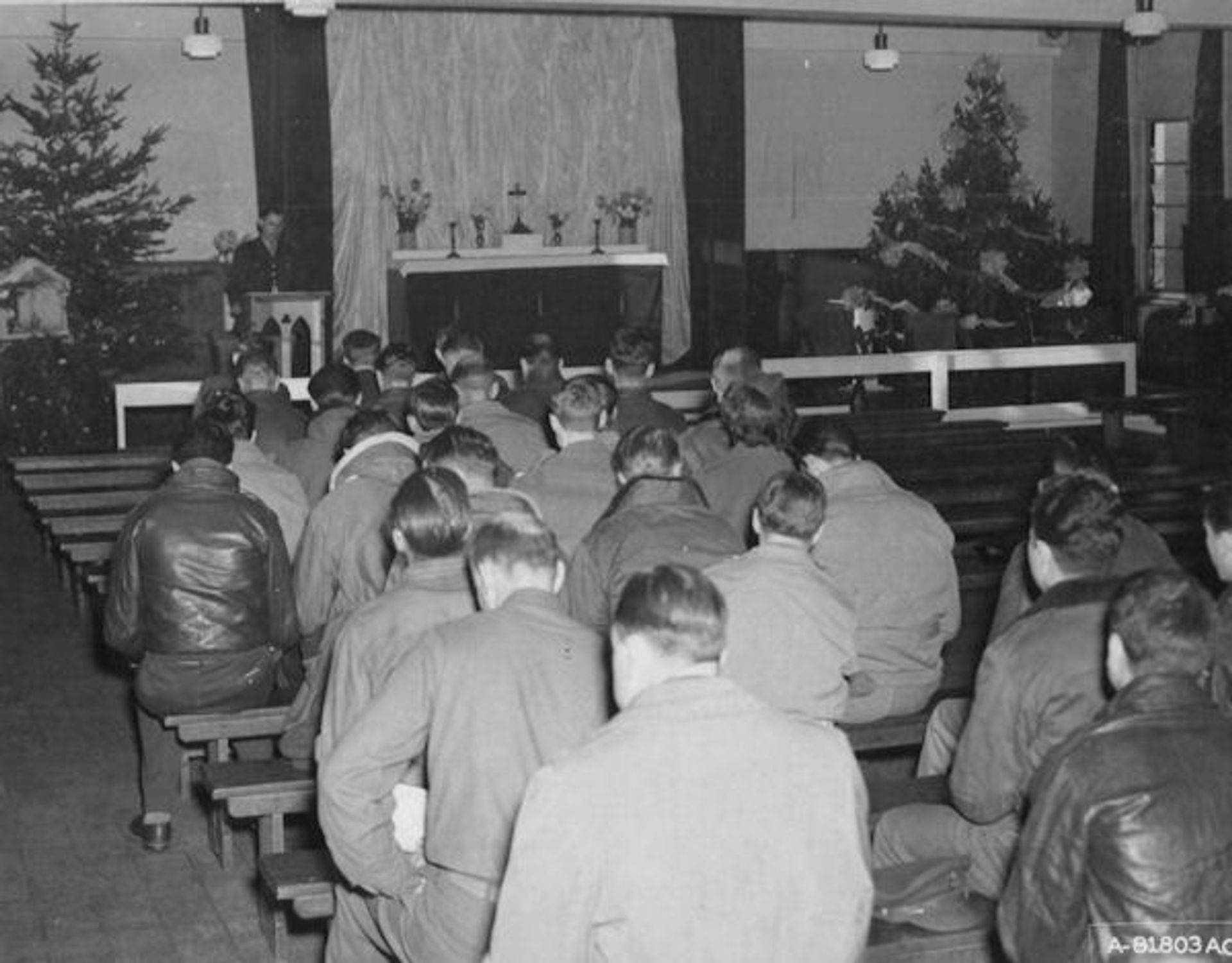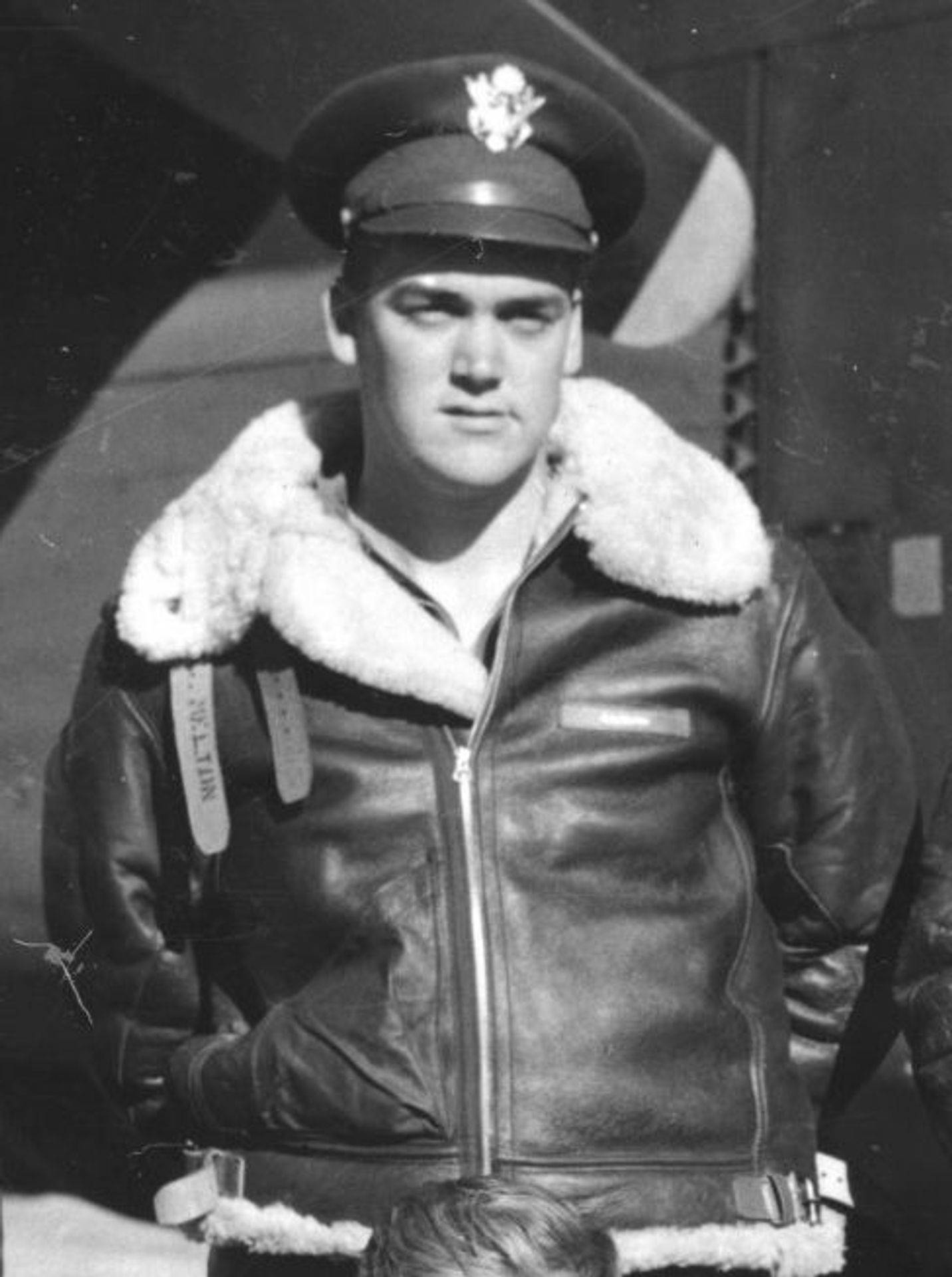458th Bombardment Group (H)
Captain Leonard P. Edwards
Group Chaplain, 458th

Reverend Edwards holds Easter Service 1945
A Chapel Service to Remember
Upon the arrival of our bomber group at our overseas station at Horsham St. Faith outside of Norwich, England, the first duty of the Chaplain was to report to the Commanding Officer. Obviously the next task was to find designated housing. Then came the task of finding the Chaplain’s office and the Chapel.
Horsham St. Faith was a permanent British Air Field and everything was supposed to be in place. The housing and office were easy to locate, but the Chapel proved to be a problem. There was a beautiful Chapel on the base, paneled, furnished with pulpit, furniture, and pews. The problem was that there was only room for 50 worshipers at a time. With some 2000 men in our unit, seating for 50 would not nearly meet our needs.
After searching out several possibilities, the Chaplain was given permission to use one of the enlisted men’s mess halls for both the Catholic and Protestant services. This served us very well until our services grew in numbers and we finally ended up in an unused mess hall on the second floor and became our adequate Chapel for our stay on that base.
One beautiful spring Sunday morning, that I guess is rare in East Anglia, England, our set-up crew had prepared our downstairs mess hall for our Protestant Chapel Service. Everything was in place and the fellows came in to worship.
You might be interested to know that two dogs had adopted some of the enlisted men and came to chapel service every Sunday. The dogs seemed to sense the sanctity of the service and usually lay down near their new-found friends. We did have a disturbing problem with one of the dogs. I do not know whether or not dogs snore, but I do know that one of the dogs certainly breathed very loudly when he went to sleep. So his buddies tried to keep him awake during the service.
All was going well that fateful Sunday, the men were singing well and attentive as the service progressed, UNTIL – a cat jumped up on the window sill. The window had been open to let some of that beautiful spring warmth in. She sat there for a moment surveying the area, and then spotted the dogs, or at least one of the dogs. Well!! Dogs did not belong in her territory, so she proceeded to put the dogs out of the mess hall, but remember a Protestant church service was taking place, but not for long!
A literal cat and dog fight blossomed into a donnybrook. How does one describe the hissing and barking, the sudden chaos? Chairs were being tipped over as the men tried to separate cat and dogs, other fellows scrambling to get out of the arena and others trying to figure out what was happening and where there was a safe haven.
Calm at last had been established. The men who had fled the scene of combat were coming back in, and a restless peace settled upon the area. As gracefully as possible the Chaplain called for a word of prayer and pronounced a timely benediction.

Captain Leonard P. Edwards, 458th Group Chaplain
Call it a Rerun
It was a good night for sleeping in July of ’93 and usually I sleep well. But that night I had a busy time dreaming, something I very seldom do. For some unknown reason I was reliving a particular occasion during my time in England as the Group Chaplain of the 458th Bomb Group Heavy, stationed at Horsham St. Faith near Norwich, England.
One of our B-24’s had had to crash land in southern England after being badly shot up over Germany in a bombing run. It had taken the lives of all the crew. Arrangements were made for a B-24 crew to fly me as the Chaplain to conduct a funeral service for the men to be buried in Brookwoods, a World War I United States cemetery.
This sad service having been accomplished, we returned to the airfield for our return flight. It was, let me call it, a makeshift air strip at best. The main runway was made up of steel mesh sheets laid on the grass field. We taxied onto the strip and soon were getting up our air speed for take-off. To say the least we bounced up and down where the mesh sheets were fastened together and finally on one big bounce we were airborne. But in the process our nose wheel did not take its usual position and could not be retracted.
So we flew back to Horsham with our wheels down. But what would happen when we touched down on our home airfield? Group did not know. Wing did not know. Pinetree did not know. So, prepare for a crash landing. Out came the fire trucks and the “meat wagons” and we prepared the plane to crash land. Except for the pilot and co-pilot all others were to rush to the rear as we touched ground, hoping our weight back would keep the plane from nosing over when the nose wheel touched. All is set. We make our approach to the field and when we touch down the nose wheel snapped in its correct position and we made what could be called a routine landing, many thanks to the men up front.
The Base Commander, Colonel Isbell, was at the end of the runway and when he saw me get off the plane he said to me, “If I had remembered that you were on that plane, I would have put you, by parachute, into the North Sea. You are not expendable.”
So far the story is fact. But remember that I am dreaming.
Again we are flying back to base in a crippled plane. In communication with the ground, it is decided that the Chaplain must parachute into the North Sea. I was wearing not only a back pack, but also a chest pack. The crew made sure that both chutes were in good order and that I be sure to count to 10 slowly before I pulled the ripcord.
Out of the plane the Chaplain goes and dutifully counts 10 slowly before pulling the ripcord of the back pack. Looking up to watch that chute open it was now time to gather my wits. As had been promised, a British Air-Sea Rescue boat had been dispatched. Sure enough there it was headed for my drop point. But what was that just under the surface very close to the drop point? Of all things, it was a German submarine, dead in the water. I do not know how my dream knew that it was German, it just was.
Now an interesting, at least, situation was developing. When the parachute and its passenger dropped into the water what would the sub do? To shorten a few anxious moments, into the waters of the cold, cold North Sea went the Chaplain and the parachute. Right there was the British Air-Sea Rescue craft. I was letting the men in the boat know in no uncertain terms that there was a hostile sub practically under us. After being fished out of the water, I called for the lines of the chute to be cut and to forget it, which was promptly done. All on board watched the chute drift down and into the cage surrounding the propellers of the sub. At that moment the submarine started its engines. When the screws began to turn they entangled the chute causing the propellers to grind to a halt. Now the sub was really dead in the water.
The crew of the Air-Sea Rescue boat cried out in unison, “The American Chaplain has captured a German submarine single-handed!” The crew wanted to hang around and see what would happen as the British Navy had been alerted and were on their way to tow the sub into shallow water and capture the Germans.
I wanted to get to shore to warm and dry clothes. The boat crew was finally persuaded to head back to port. Once on shore, there was the mayor of the city in his regalia. Word had spread and everybody wanted to shake the hand of the new “hero”. Cold and wet, now wrapped in a blanket, and his wool uniform beginning to shrink, the Chaplain pleaded to be given transportation back to his base. At long last I was on my way back to Horsham St. Faith still very cold and wet.
As we entered the home base the guard at the gate said, “The Colonel wants you to report to him immediately.”
“Could it not wait until after a shower and dry clothes?”
“Now!”, was the command.
In front of headquarters the staff was waiting, handshakes all around, accolades, and you name it, but the Chaplain was still very cold and wet. The Colonel wanted to go immediately to the City of Norwich as the Commanding General was to have pictures taken and for him to make a speech. Still our “hero” was wet and getting colder.
After much pleading I was permitted to get a shower and dry clothes, but “on the double!” The procession of command cars, jeeps, and trucks headed for Norwich. The speeches, the pictures, the interviews of press and radio, the hand shaking, and on and on. Why there was no censorship I will never know. Then all of a sudden everyone departed leaving me in the middle of the Haymarket, alone!
No jeep, no liberty run, nothing. So I walked slowly back to base. What price glory!
When I told my wife about my dream, she indicated that had she known about the dream at the time, she would have reached over as I woke to see if my hair had dried yet.
Both of these stories and photos are courtesy Reverend Leonard P. Edwards
Christmas 1944

Photo: FOLD3.com
1Lt Charles A. Melton – Pilot

May 27, 1996
Chaplain Leonard P. Edwards
7 Cross Street
Danvers, Mass.01923
It seems appropriate that I should be writing this on Memorial Day. Too often we never know whether the service we perform produces results or not. I feel that this is particularly true of the ministry you have rendered over the years. I hope to show you that your ministry did impact my life and I feel very sure that of many others.
I was a pilot assigned to the 458th Bomb Group, 755th Squadron, [Crew 67] in the early days in Boise, Idaho. I went through crew training there, then Wendover, and at Tonopah. We went from there to Horsham St. Faith, via South America, Africa, and to England, arriving at Horsham in completed our 30 missions on D-Day, June 6, 1944. Coincidentally, that was also my 5th wedding anniversary.
I remember that you always saw us off on our missions and said a prayer for us. I was a bit skeptical at the time, wondering how prayers for us would balance out with those of a chaplain on the other side. I wondered what would cause God to choose us for protection. However, your prayers dispelled that confusion. You said the prayer that has helped to shape my life. I have quoted you in management, in training sessions, command decisions, etc., many times. You asked that we would do our duty in such a way that we would not in any way dishonor nor tarnish the uniform we wore nor the Country we served. That, sir, is a creed that any man should be honored to claim.
I believe I am correct that you even volunteered for a mission and because of aircraft damage you had to bail out over merry old England.
I have tried to live up to that creed, not always successfully I fear, but I have always remembered your words and have tried to do it.
For years I have wished I could let you know how you influenced my life, but until your article appeared in the current issue of the 2AD Journal, I had no idea how to do so. Evelyn Cohen kindly gave me your address and I hope this reaches you at last. Thank you for your inspiration to others. I feel you are entitled to know the good you did. I know I am forever in your debt.
Sincerely,

CHARLES A. MELTON. Lt. Col. USAF (ret)
Route 3, Box 122
Ava, Missouri 65608
Letter Courtesy: Tom Visser, grandson of Chaplain Edwards
